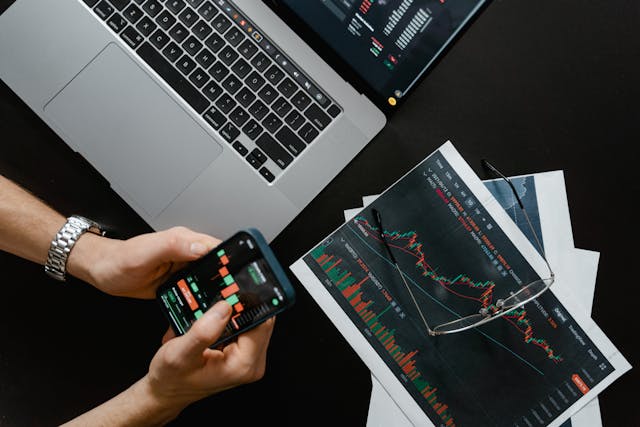Expiry Day in The Stock Market: What It Means and How It Affects Your Trades

Strong 8k brings an ultra-HD IPTV experience to your living room and your pocket.
Trading in financial markets can be both an exciting and unpredictable experience. One of its critical aspects is understanding 'Expiry Day' and its implications on trading decisions. This article delves into what expiry day means, how it impacts your trades, and the distinctions between forex trading vs. stock trading, with insights on terms like ETF meaning. Calculations are presented in INR to ensure relevance and context for Indian investors.
Gain clarity on forex trading vs stock trading by exploring how 'Expiry Day' uniquely affects each market, and make informed decisions with insights tailored for Indian investors.
Understanding Expiry Day
Expiry in the stock market refers to the final day on which the futures and options contracts are valid. Post this day, all contracts must be settled, leading to the realization of profits or losses for traders holding these contracts. In India, this pivotal day falls on the last Thursday of every month. If it coincides with a market holiday, the expiry shifts to the preceding Wednesday.
Impact of Expiry Day on Trades
1. Increased Volatility: Expiry days are notorious for heightened volatility. Traders rush to close or roll over their expiring contracts, leading to significant fluctuations in price. For instance, let's consider Nifty Futures. Assume you bought a Nifty futures contract priced at INR 15,000. As the expiry approaches, if the market trends upward, prices might surge to INR 15,300. This sharp movement is typical as traders adjust their positions.
2. Volume Surge: There’s often a spike in trading volumes. High volumes usually indicate the liquidation of outstanding positions. Let’s consider Stock XYZ trading at INR 500. If traders hold substantial long futures contracts, they might sell in the spot market to hedge positions, amplifying volume and volatility.
3. Time Decay: In options trading, the proximity to expiry escalates the impact of time decay (Theta). For options traders, the value of premium (the cost to buy the option) erodes more quickly as expiry approaches. If you purchased a call option for Stock ABC at a strike price of INR 600 for a premium of INR 50, and the stock is trading at INR 590 close to expiry, the premium might fall drastically, hurting the position's value.
Forex Trading vs. Stock Trading
While expiry pertains directly to futures and options in stock trading, it's crucial to understand its distinction from forex trading.
1. Nature of Instruments: Forex trading involves trading in currency pairs, such as INR/USD. There is no concept of expiry in the traditional sense; trades continue until positions are closed. Conversely, in stock trading, contracts like futures and options have a predefined expiry date.
2. Market Hours: Forex markets operate 24 hours a day, five days a week, offering constant trading opportunities. Indian stock market transactions, including futures and options, are limited to specific hours (9:15 AM to 3:30 PM IST).
Concept of ETF
Exchange-Traded Funds (ETFs) function differently from futures and options. ETFs are investment funds traded on stock exchanges, much like stocks. They track indices, commodities, or a mixture of various assets, providing diversification without the expiring urgency linked with futures and options. For example, if you invest in an ETF tracking the Sensex, your investment reflects the movement of Sensex as a whole.
Example Calculation in INR
Let’s now understand stock futures with a simple calculation. Suppose you have taken a long position in Reliance Stock Futures:
- Contract Price: INR 2,500
- Lot Size: 250 shares
- Margins (Assume 20%): 2,500 * 250 * 20% = INR 1,25,000
- Total Contract Value: 2,500 * 250 = INR 6,25,000
If the price at expiry is INR 2,600, your profit will be :
- New Value: 2,600 * 250 = INR 6,50,000
- Profit: 6,50,000 - 6,25,000 = INR 25,000
This underscores the potential gains but also highlights risk elements due to market movement.
Factors Influencing Trading Strategies on Expiry Day
1. Market Sentiment: Trader’s behavior is significantly influenced by market sentiment. Understand if the prevailing sentiment is bullish or bearish, as it drives contract settlement actions.
2. Hedging Actions: Institutional investors often hedge their positions by taking contrary trades. For example, if an institution has sizable long transactions in Reliance stocks, they might short futures to mitigate losses.
3. Rollover Analysis: The decision on whether to let the contract expire or to roll over to the next month is made on ROI analysis. This involves comparing the cost and benefits of the current position with future market scenarios.
Conclusion and Investment Disclaimer
Understanding the mechanics of expiry day, its impacts, and the nuances between forex trading vs. stock trading can significantly help traders make informed decisions. ETF meaning provides a valuable perspective, offering investment within indices without futures' expiry pressures. Each trading strategy should encompass thorough analysis, encompassing profit, risk management, and market behavior around expiry.
Disclaimer
This article is meant for informational purposes and should not be construed as financial advice. Investors should diligently evaluate the pros and cons of trading in the Indian stock market and consider their financial situation and objectives before making any trading decisions.
Navigating the complexities of expiry and trading can be a learning curve, and staying informed is fundamental.
Note: IndiBlogHub features both user-submitted and editorial content. We do not verify third-party contributions. Read our Disclaimer and Privacy Policyfor details.







